Signs of the Times • 10 June 2016 • No. 76
Special edition
Sexual assault
There is no subtle way to have a conversation about sexual assault and rape. Nevertheless, we must endure the discomfort.
If you can read no further on this page, I urge you to read the statement by the Stanford University campus rape victim. She remains anonymous, but she had the moxie to not only write this but also to read this missive (and it is long)—in court and in the presence of her attacker and the case’s presiding judge.
This is a modern-day epistle, a dispatch from the traumatized trenches of gender bias. See “Make a new name” below.

Above: “Heart of the Dragon” by Beth Moon. These remarkable trees grow on the island of Socotra, off the horn of Africa. See more of her duotone prints of exotic trees.
¶ Processional. “Till it Happens to You,” Lady Gaga.
¶ Invocation. “I was tortured in the desert / I was raped out on the plain / I was murdered by the high way / And my  cries went up in vain / My blood is on the mountain / My blood is on the sand / My blood runs in the river / That now washes through their hands / I am lost unto this world.” —Emmylou Harris, “Lost Unto This World”
cries went up in vain / My blood is on the mountain / My blood is on the sand / My blood runs in the river / That now washes through their hands / I am lost unto this world.” —Emmylou Harris, “Lost Unto This World”
¶ Call to worship. “Men: Our hearts sag with sorrow when the history of such misery is unveiled. / Women: Such truthfulness comes at a cost. But worthy is the truth. / M: What good can come from such vile remembrance? Can we not safely and silently dispose of such memory? / W: No, not safely. Heaven still hears. The roots are deep. The seeds are dormant. The brutal harvest continues.” —continue reading “Limb by limb: Repenting and repairing a legacy of violence against women,” a litany for worship
¶ Make a new name. “What makes this particular moment uncommon is the action of one character: the victim of Brock Turner’s rape, whose name is still not publicly known but who has been anything but silent.
“Her letter, read in court at Turner’s sentencing, is one of the most articulate pain-soaked statements I have ever read. The sheer fact that she rose above her trauma to say anything publicly is amazing by itself.
“But her letter is not only about pain. There is an anguish-transcending majesty in her narrative.
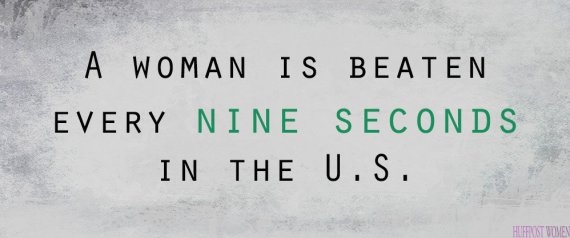 “What she says is must-read material.” —continue reading Ken Sehested’s “Make a new name: One unnamed woman’s contribution to confronting a culture of rape”
“What she says is must-read material.” —continue reading Ken Sehested’s “Make a new name: One unnamed woman’s contribution to confronting a culture of rape”
¶ Hymn of praise. “All My Tears (Be Washed Away),” by Selah.
¶ Sexual assault in the US.
•Sexual assault occurs every two minutes.
•1 out of 6 females will be victims of attempted or actual rape. (3% of men experience the same.)
•Well over 60,000 children are victimized each year.
•Each year nearly 20,000 military personnel reported unwanted sexual contact.
•More than 80,000 inmates are assaulted.
•It’s estimated that some 20% of women in college suffer some form of sexual assault.
 •Rape has been an intentional war tactic in places from the former Yugoslavia to the Democratic Republic of Congo. In Afghanistan, women who are raped are imprisoned.
•Rape has been an intentional war tactic in places from the former Yugoslavia to the Democratic Republic of Congo. In Afghanistan, women who are raped are imprisoned.
•It’s impossible to say accurately how many assaults are not reported. The estimate is usually around 67%. But the US Department of Justice estimates that 80% of campus rapes go unreported.
• In 97% of sexual assaults the perpetrators never serve time in prison.
•Approximately two-thirds of rapes occur by someone known to the victim.
•Males and females experience sexual assault—but not alike. The overwhelming percentage of victimizers are men.
•Many sexual assault victims remain silent because of many, often overlapping reasons: trauma, shame, fear of retaliation, disbelief by authorities.
•In 2012 Richard Mourdock, the Republican candidate in Indiana for the US Senate, said in a debate that pregnancy after a rape was “something that God intended to happen.” (Later he issued a press statement saying 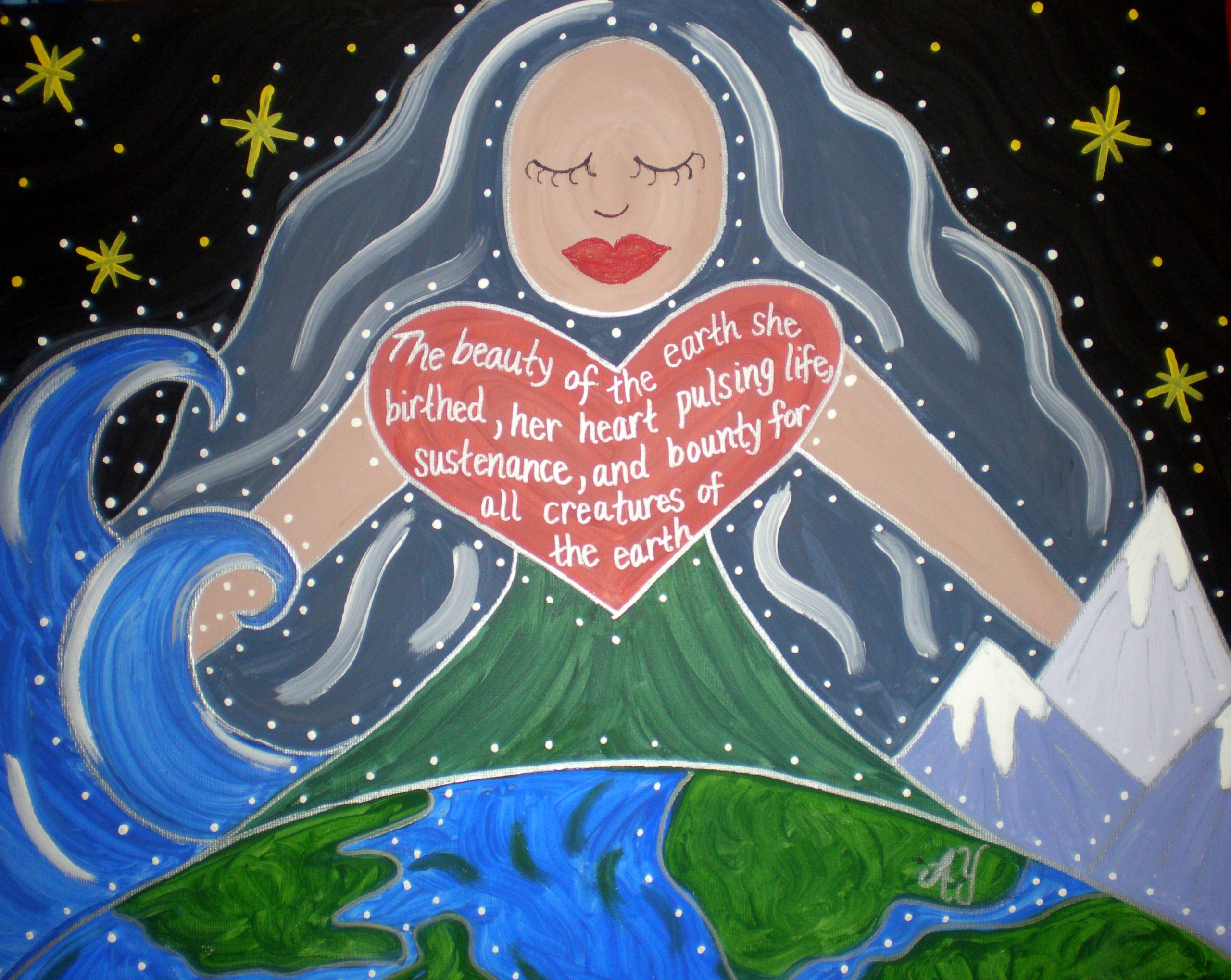 that he had “misspoken.”)
that he had “misspoken.”)
[Sources: RAINN (Rape, Abuse & Incest National Network); US Department of Justice, “Raising Awareness About Sexual Abuse: Facts and Statistics” ; US Department of Justice, “Rape and Assault Among College-age Females, 1995-2013]
Right: “Gaia” by Angela Yarber, from her book, “Holy Women Icons.”
¶ A note to pastors. Judges 19:1-30 does not appear in the lectionary cycle. Chances are you’ve never chosen this text even when you left the lectionary reservation. I’m not at all sure children should be exposed to this story. It’s likely this is the most brutal in all of scripture. But it’s one we simply must confront.
¶ Mission idea for groups of men. If your congregation doesn’t already have ties with a local women’s advocacy organization—attending to and/or sheltering victims of domestic violence—make this a priority. At some appropriate season (e.g., October is Domestic Violence Month), organize the men in your church to pool personal contributions to support this work in your area, challenging your local congregation to match from its mission budget an amount equal to what you as men are able to raise.
¶ For more information on Domestic Violence Month, visit the National Network to End Domestic Violence” website.
¶ The best book I know surveying neglected or undervalued stories of women in scripture is Joyce Hollyday’s 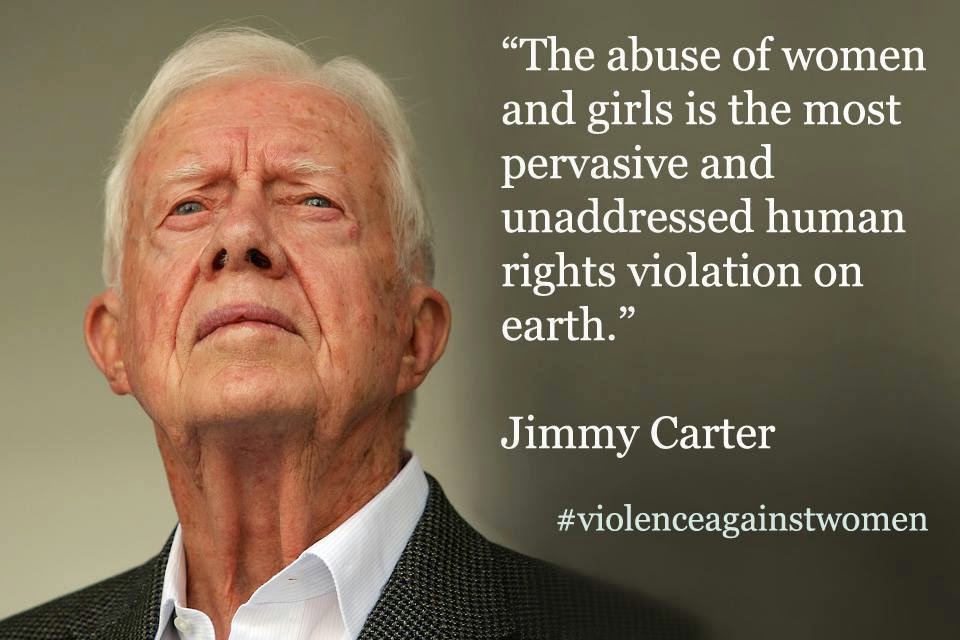 Clothed With the Sun: Biblical Women, Social Justice & Us. This is an excellent resource for group study or personal devotional reading (particularly if you prefer devotional material that is more substance, less sentiment).
Clothed With the Sun: Biblical Women, Social Justice & Us. This is an excellent resource for group study or personal devotional reading (particularly if you prefer devotional material that is more substance, less sentiment).
¶ Language matters.
•“El Shaddai” is one of several “names” given to God in Scripture. El Shaddai is a feminine noun, which can be translated “God of the breast,” conveying the quality of nourishing, satisfying and supplying needs. It is used seven times in Scripture (see Genesis 17:1).
•The English translation of “El Shaddai” as “God Almighty” is misleading, because “almighty” suggests omnipotence, the capacity to overpower or destroy. Whereas “Shaddai” infers sufficiency and nourishment (i.e., “blessings of the breasts and of the womb”) and implies a certain fecudity.
•In Hebrew the words for “compassion” and “womb” derive from the same root. God of compassion (Exodus 33:19 and 34:6) use the Hebrew word “rehem” which can be translated “womb-love.”
•Also in Hebrew, the divine presence (“Shekhinah”) of God is feminine.
¶ Feminine images of God.
•The Creator God of Israel is also imaged as the shaper, maker and mother God who formed Israel in the womb and birthed Israel with labor pains: Deut 32:18; Ps 90:2; Prov 8:24-25; Isa 43:1,7,15; 44:2, 24; 45:9, 11; 51:13; 54:5.
• From the word “womb” (rehem) comes the verb “to have compassion” (raham), and the phrase “Yahweh’s  compassionate (rahum) and gracious” repeatedly appears in the Hebrew scripture to describe the merciful and saving acts of God in history.
compassionate (rahum) and gracious” repeatedly appears in the Hebrew scripture to describe the merciful and saving acts of God in history.
•Deut 4:31; 2 Chr 30:9; Neh 9:17; Ps 78:38; 86:16; 103:8; 111:4; 112:4; 145:8; John 4:7 – images of God who demonstrates “womb-like compassion” for her child Israel.
• Num 11:12 – “Was it I who conceived all this people, was it I who gave them birth that you should say to me, carry them in your bosom like a nurse with a baby at the breast?”
•Prov 7-9 –“Wisdom” (“Sophia”) who was present before the foundations of the world were created
• John 7: 38 – From his breast shall flow the fountains of living water
• Gen 1:2 – nesting mother
• Ex 19:4 & Deut 32 :1-12 – mother eagle
• Hos 13: 8 – “I will fall upon them like a bear robbed of her cubs.”
• Ps 17:8, 36:7, 57:1, 61:4 – Refuge in “the shadow of [God’s] wings”
• Job 38:28-29 – “Has the rain a father, or who has begotten the drops of dew? From whose womb did the ice come forth, and who has given birth to the hoarfrost of heaven?”
• Luke 15:8 – A woman tirelessly sweeping for her lost coin, for what is important to her
• Luke 13: 34 (Matt 23:37) – “How often I desired to gather your children together as a hen gathers her brood under her wings”
• Gen 2:7, Ps 104: 29; John 3:8 – “Ruah” presence gives life; feminine Hebrew word meaning breath, wind, inspiration or spirit
 • Gen 3:21 – seamstress
• Gen 3:21 – seamstress
• Isa 4:4, Ps 51:7 – washerwoman
• Ps 22:9 – 11, Ps 71:6; Isa 66:9 – midwife
• Matt 13:33 – woman baking bread
• 1 Thess 2:7 – The apostles described themselves as “nursing mothers”
(Much of the above material was drawn from “’Biblical proofs’ for the Feminine Face of God in Scripture,” Mike Morrell )
Left: Illustration of the woman of the Apocalypse in Hortus deliciarum (redrawing of an illustration dated c. 1180), depicting various events from the narrative in Revelations 12 in a single image.
¶ “In the divine economy it is not the feminine person who remains hidden and at home. She is God in the world, moving, stirring up, revealing, interceding. It is she who calls out, sanctifies, and animates the church. Hers is the water of the one baptism. The debt of sin is wiped away by her. She is the life-giver who raises men [sic] from the dead with the life of the coming age. Jesus himself left the earth so that she, the intercessor, might come.” — Jay G. Williams, “Yahweh, Women and the Trinity,” Theology Today 32 (1975) 240.
¶ “Hail Mary, full of grace, the Lord is with thee; blessed art thou among women, and blessed is the fruit of thy womb, Jesus. Holy Mary, Mother of God, pray for us sinners, now and at the hour of our death. Amen.”
¶ “You, beloved daughters, serve as reminders / that life cannot be had on the cheap; / that every new future foreseen in joy / will endure all tearful failures; that strength / of hand and valiance of heart must be / coupled with wombish welcome to that / unnameable (and thus unmanageable) / Promise that death’s ascendance will / be crushed. / Such vision persists; such milk flows; / and by it we are kept from perishing.” —Ken Sehested, “On the flow of tears”
¶ Can’t make this sh*t up. “[T]he church must recover biblical manhood, Christian masculinity — what we might think of sanctified testosterone.” —Jason Allen, president of Midwestern Baptist Theological Seminary, Kansas City, Mo., Baptist News Global
¶ Confession. “She hides her shame / Like she hides her face / Locks away the pain / In the secret place.” —Zoë 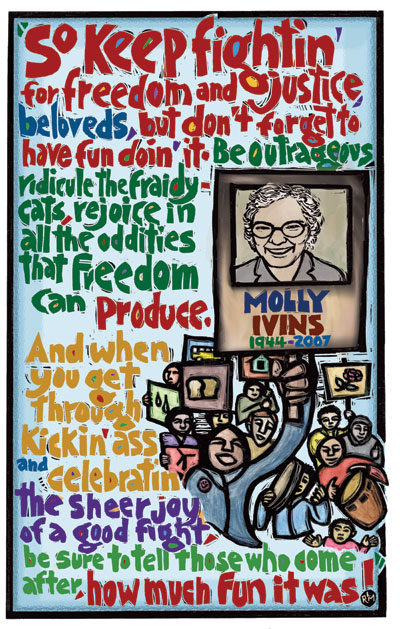 Bestel, “Just Another Girl” (click the “show more” button to see all the lyrics)
Bestel, “Just Another Girl” (click the “show more” button to see all the lyrics)
¶ Words of assurance. “All the weary mothers of the earth will finally rest; / We will take their babies in our arms, and do our best. / When the sun is low upon the field, / To love and music they will yield, / And the weary mothers of the earth will rest.” —Joan Baez, “All the Weary Mothers of the Earth”
¶ Hymn of intercession. “Her Demon,” Hollow Hearts & Infectious ft: Callie Kathleen.
¶ Preach it. “The Bible may be the original ‘reality’ show. The mess we now get on TV is there in this ancient literature. If you happen to think the Bible is loaded with uniformly nice, sweet, godly characters, you haven’t done much reading. Misogyny, among other morally-debased activities, is all over the place. I happen to think just such a body of literature is what helps us see and resist the violent and profligate culture in which we now live.” —continue reading Ken Sehested’s “She was not: The Bible’s most vividly violent story, and why we must read and remember it”
¶ Call to the table. “Only those with wombs of welcome / to heaven's Annunciation / can magnify God and heal the earth.” —Ken Sehested, “Anunciation”
¶ Altar call. “I Told Jesus (be alright if he changed my name),” Roberta Flack.
¶ Benediction. “When wounds heal on the world’s face / and in the pits dug by shellfire we have planted trees / and in hearts scorched by conflagration hope sprouts its first buds / and the dead can turn over on their side and sleep without complaining / knowing their blood was not spilled in vain, / this is peace. —Yannis Ritsos, “Peace”
¶ Recessional. “The Parting Glass,” The Wailin’ Jennys.
¶ Lectionary for Sunday next. We love to quote the first verse of Psalm 42: “As a deer longs for flowing water, so my soul longs for you, O God.” We often fail to note that it is connected with verse 3: “My tears have been my food day  and night, while people say to me continually, ‘Where is your God?’”
and night, while people say to me continually, ‘Where is your God?’”
¶ Just for fun (and in time for summer). “Long Hot Summer Days,” Sara Watkins.
# # #
Featured this week on prayer&politiks:
• “Make a new name: One unnamed woman’s contribution to confronting a culture of rape"
• “Limb by Limb: Repenting and repairing a legacy of violence against women"
• “She was not: The Bible’s most vividly brutal story, and why we must read and remember it,” a sermon
• “Remembering Jephthah’s Daughter,” a litany for worship inspired by Judges 11:29-40
©Ken Sehested @ prayerandpolitiks.org. Language not otherwise indicated above is that of the editor. Don’t let the “copyright” notice keep you from circulating material you find here (and elsewhere in this site). Reprint permission is hereby granted in advance for noncommercial purposes.
Your comments are always welcomed. If you have news, views, notes or quotes to add to the list above, please do. If you like what you read, pass this along to your friends. You can reach me directly at kensehested@prayerandpolitiks.org.



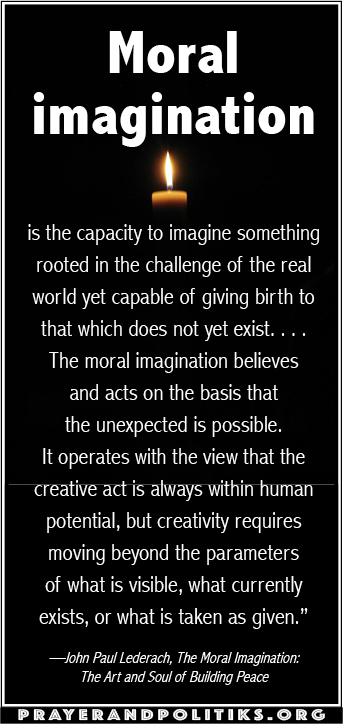 How our language highlights or disguises violence.
How our language highlights or disguises violence. either there or elsewhere.” —Union Maj. Gen. Gordon Granger, General Orders, Number 3; Headquarters District of Texas, Galveston, June 19, 1865
either there or elsewhere.” —Union Maj. Gen. Gordon Granger, General Orders, Number 3; Headquarters District of Texas, Galveston, June 19, 1865 passenger if they would like to sign a card to the woman. Read what else happened. —Colby Itkowitz, “
passenger if they would like to sign a card to the woman. Read what else happened. —Colby Itkowitz, “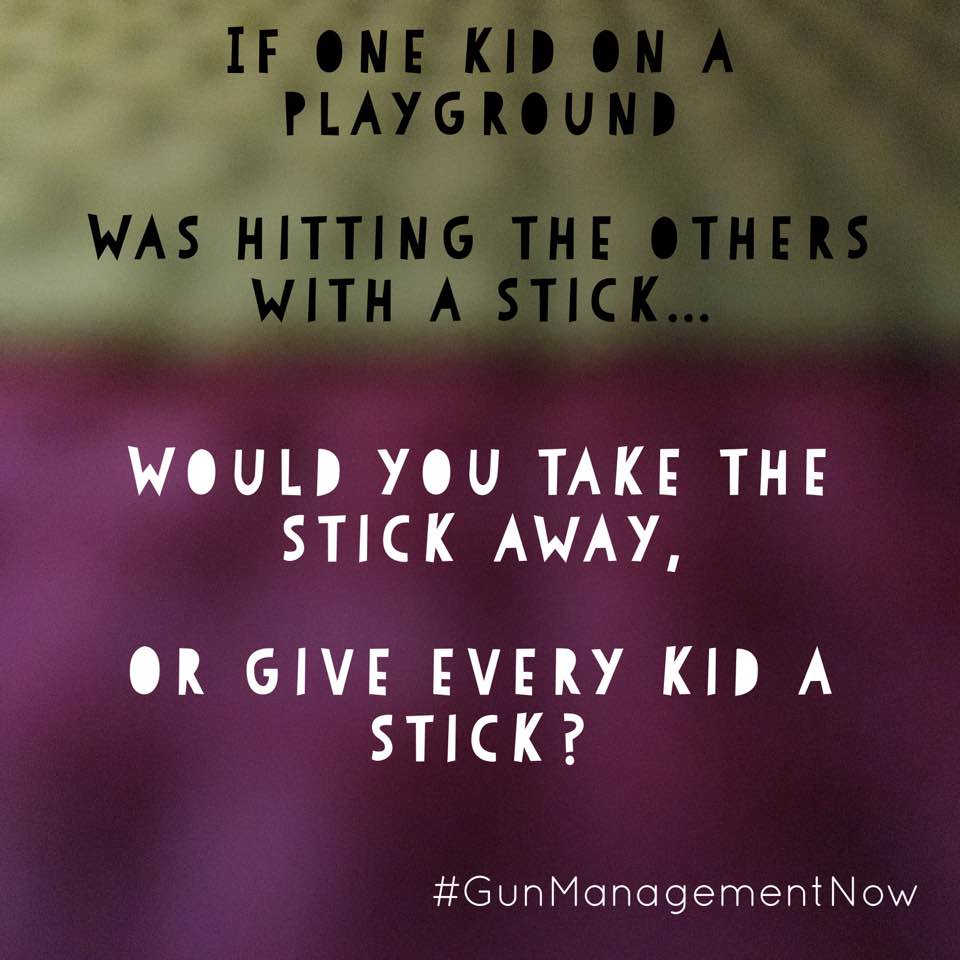 misguided Muslim commits an act of violence, the entire religion and all its followers are questioned and placed under suspicion in a way that isn’t replicated with other faiths. We—and this of course includes queer Muslims—have to take extra care walking down the street at night and entering our mosques for fear of Islamophobic attacks.” —
misguided Muslim commits an act of violence, the entire religion and all its followers are questioned and placed under suspicion in a way that isn’t replicated with other faiths. We—and this of course includes queer Muslims—have to take extra care walking down the street at night and entering our mosques for fear of Islamophobic attacks.” — the whole world is watching. / Much more often, the storyline of faith is lived without / notoriety, is forged without fanfare: / in familiar places, / in small acts of courage against petty tyrants, / with commonplace forbearance in the midst / of garden-variety stress.” —continued reading Ken Sehested’s “
the whole world is watching. / Much more often, the storyline of faith is lived without / notoriety, is forged without fanfare: / in familiar places, / in small acts of courage against petty tyrants, / with commonplace forbearance in the midst / of garden-variety stress.” —continued reading Ken Sehested’s “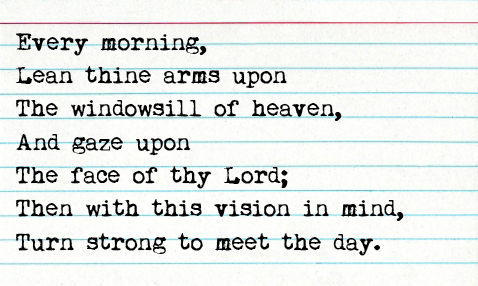 ¶ On the night before my Dad’s funeral in 2001, my wife found this card (right) in his Bible. He had at some point typed it out, hunt-and-peck-one-finger method, on their old manual typewriter. Author unknown.
¶ On the night before my Dad’s funeral in 2001, my wife found this card (right) in his Bible. He had at some point typed it out, hunt-and-peck-one-finger method, on their old manual typewriter. Author unknown.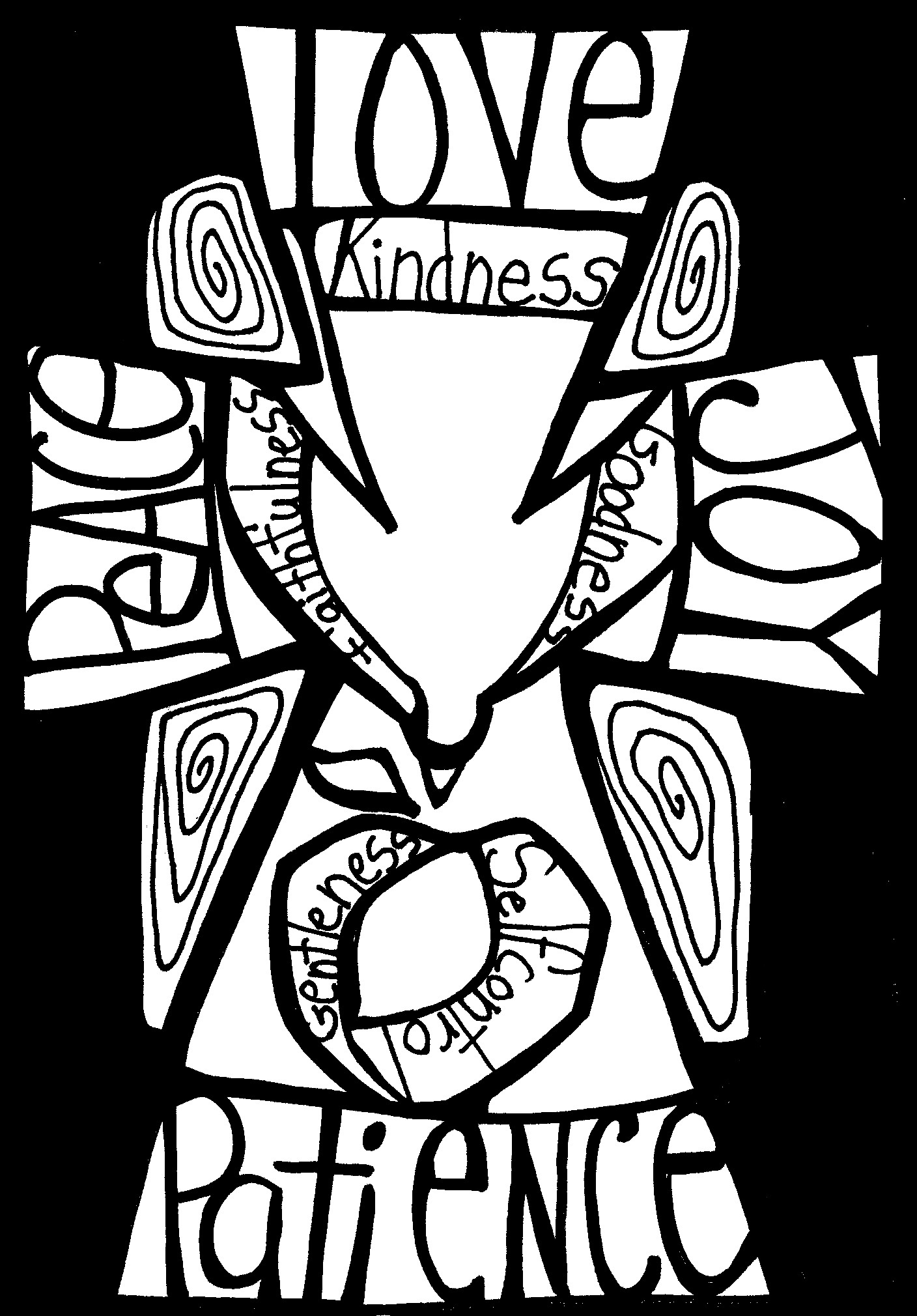 particularly those where the surviving parent has to be less absorbed with power-tool sales and more attentive to laundry and dark-of-night cries and stretching food budgets. —Ken Sehested, from a 2005 Father’s Day sermon
particularly those where the surviving parent has to be less absorbed with power-tool sales and more attentive to laundry and dark-of-night cries and stretching food budgets. —Ken Sehested, from a 2005 Father’s Day sermon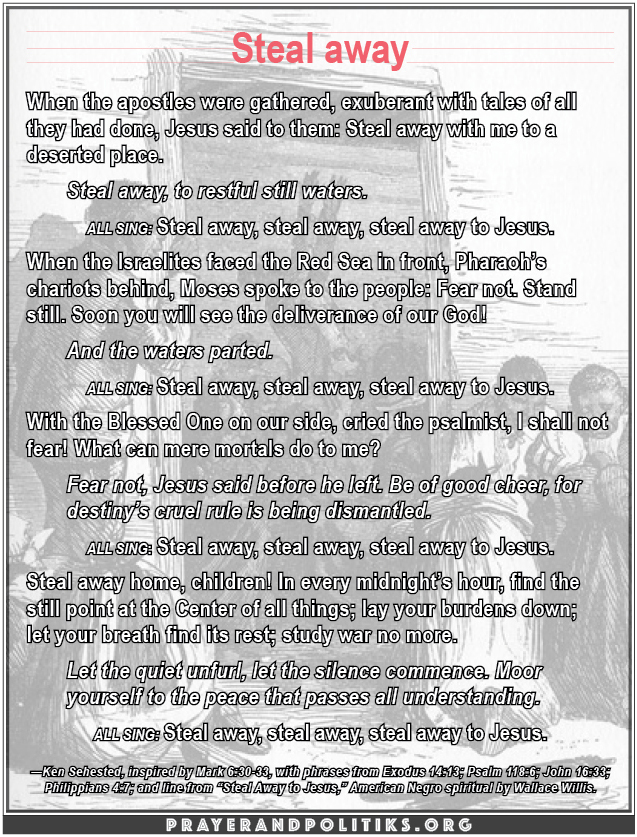
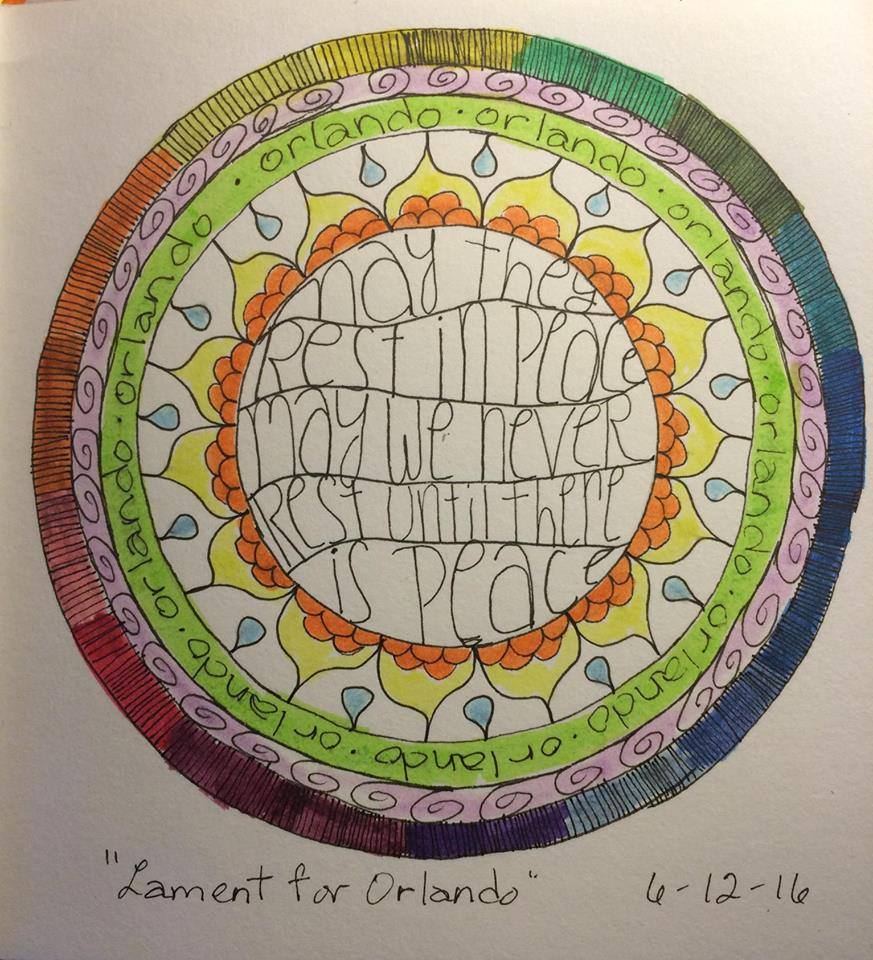 ings got so bad that dissenting Pastor Roger Williams wrote that it is “directly contrary to the nature of Christ Jesus . . . that throats of men should be torne out for his sake.”
ings got so bad that dissenting Pastor Roger Williams wrote that it is “directly contrary to the nature of Christ Jesus . . . that throats of men should be torne out for his sake.” them not to win an argument but to illustrate the fire-sale price put on human life when fear and hubris ignite in the bloody conflagration known as terrorism and hate crimes, inspired by one or another narrative of redemptive purpose.
them not to win an argument but to illustrate the fire-sale price put on human life when fear and hubris ignite in the bloody conflagration known as terrorism and hate crimes, inspired by one or another narrative of redemptive purpose. Perdue (R-GA) encouraged participants to pray for President Obama in a particular way, “like Psalm 109:8 says, ‘Let his days be few.’” It was a thinly-veiled death wish (if not an actual threat), since the following verse reads “May his children be fatherless and his wife a widow.”
Perdue (R-GA) encouraged participants to pray for President Obama in a particular way, “like Psalm 109:8 says, ‘Let his days be few.’” It was a thinly-veiled death wish (if not an actual threat), since the following verse reads “May his children be fatherless and his wife a widow.”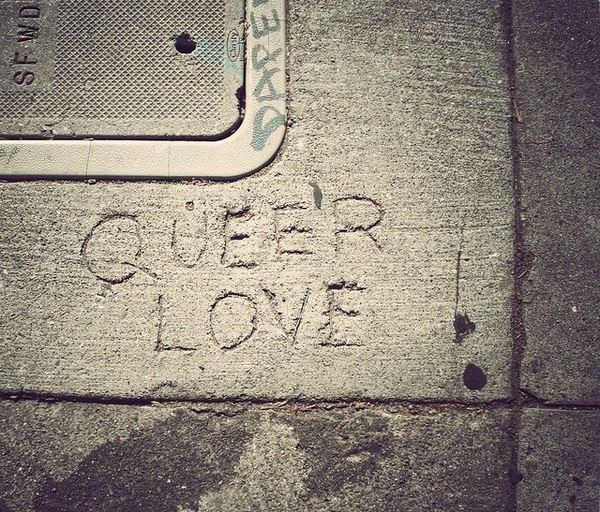 I did not know until minutes ago that “long war” is a “partial conversion mod for the turn-based tactics video game XCOM: Enemy Unknown and its expansion, XCOM: Enemy Within.” I confess I do not know what the previous sentence means. I was looking for a citation for something else.
I did not know until minutes ago that “long war” is a “partial conversion mod for the turn-based tactics video game XCOM: Enemy Unknown and its expansion, XCOM: Enemy Within.” I confess I do not know what the previous sentence means. I was looking for a citation for something else.
 cries went up in vain / My blood is on the mountain / My blood is on the sand / My blood runs in the river / That now washes through their hands / I am lost unto this world.” —Emmylou Harris, “
cries went up in vain / My blood is on the mountain / My blood is on the sand / My blood runs in the river / That now washes through their hands / I am lost unto this world.” —Emmylou Harris, “ “What she says is must-read material.” —continue reading Ken Sehested’s “
“What she says is must-read material.” —continue reading Ken Sehested’s “ •Rape has been an intentional war tactic in places from the former Yugoslavia to the Democratic Republic of Congo. In Afghanistan, women who are raped are imprisoned.
•Rape has been an intentional war tactic in places from the former Yugoslavia to the Democratic Republic of Congo. In Afghanistan, women who are raped are imprisoned. that he had “misspoken.”)
that he had “misspoken.”) Clothed With the Sun: Biblical Women, Social Justice & Us. This is an excellent resource for group study or personal devotional reading (particularly if you prefer devotional material that is more substance, less sentiment).
Clothed With the Sun: Biblical Women, Social Justice & Us. This is an excellent resource for group study or personal devotional reading (particularly if you prefer devotional material that is more substance, less sentiment). compassionate (rahum) and gracious” repeatedly appears in the Hebrew scripture to describe the merciful and saving acts of God in history.
compassionate (rahum) and gracious” repeatedly appears in the Hebrew scripture to describe the merciful and saving acts of God in history. • Gen 3:21 – seamstress
• Gen 3:21 – seamstress Bestel, “
Bestel, “ and night, while people say to me continually, ‘Where is your God?’”
and night, while people say to me continually, ‘Where is your God?’”